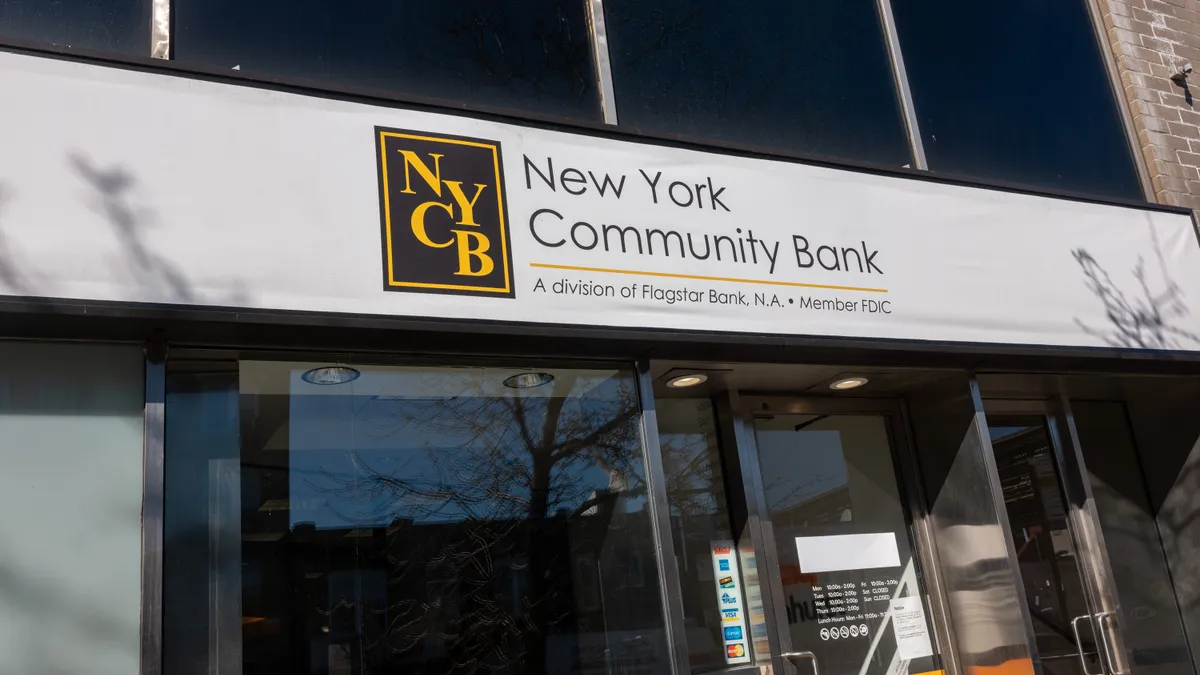New York Community Bank has its third CEO in the past two weeks — and it’s former Comptroller of the Currency Joseph Otting, NYCB said in a press release Thursday.
Otting and Trump-era Treasury Secretary Steven Mnuchin are two of the four new board members NYCB named Thursday after the Mnuchin-led Liberty Strategic Capital and other investors agreed to plow $1.05 billion into the bank, in a deal announced Wednesday.
Otting’s new role, meanwhile, will take effect April 1, the bank said.
Alessandro DiNello, the former Flagstar CEO that NYCB tapped as executive chair Feb. 6, then CEO on Feb. 25, will return to the non-executive chair role he had held since NYCB purchased Flagstar in 2022.
“When I was appointed executive chair … my job was to step in, stabilize the bank, start the turnaround [and] hand it over to someone else,” DiNello said on a call with investors Thursday, according to Bloomberg.
In his first appearance as CEO, Otting confirmed that NYCB’s deposits dropped to $77.2 billion as of Tuesday, down roughly 7% from the $83 billion it said it had as of its last update Feb. 5. Otting, however, said that reflects the “resilience of the deposit base,” according to Bloomberg.
The former OCC chief also said NYCB is cutting its quarterly dividend to 1 cent per share. That follows a cut to 5 cents, from 17, in January.
Analysts got a glimpse Thursday of Otting’s ideal future mix of assets for NYCB.
“The right balance sheet for an organization is a third of it being in consumer-related businesses, a third in commercial banking-type relationships and a third of it in real estate,” Otting said on Thursday’s call, according to Bloomberg. “I think you can probably see a path for us to head in that direction organizationally, because I think that diversification works well through economic fluctuations.”
One potential solution to NYCB’s regulatory woes is to bring the bank’s asset total under $100 billion, a threshold that triggers stricter oversight. NYCB surpassed that asset figure when it acquired much of the failed Signature Bank’s business last year.
Otting and his team intend to identify, over the next two months, portfolios NYCB could put up for sale, Bloomberg reported.
The cash infusion
The $1 billion cash infusion may well boost NYCB’s common equity Tier 1 ratio past 10%, up from 9.1% at the end of last year, Bloomberg reported.
The investment stunted a free-fall in NYCB’s stock, which reached a low of $1.70 per share Wednesday — an 84% drop from where it stood Jan. 30, before the bank announced a surprise $252 million fourth-quarter loss.
Trading of the stock, in fact, halted Wednesday, when news broke that NYCB was exploring a capital raise. NYCB’s stock value had bounced back to $3.75 per share by noon Thursday.
The cash infusion came at the right moment for NYCB, Steven Kelly of Yale University’s Program on Financial Stability told CNBC.
“This buys them a ton of time. It means the FDIC isn’t coming to seize them on Friday,” Kelly said. “You have a billion dollars in capital and a huge endorsement from someone who has seen the books.”
The investment breaks down to $450 million from Liberty, $250 million from Hudson Bay Capital Management, $200 million from Reverence Capital Partners, and smaller amounts for other investors, in a transaction the bank expects to close Monday.
NYCB will sell and issue nearly 60 million shares in aggregate to the investors, who will take a 41.4% stake in the company.
“This is a bank that [Mnuchin] bought for an eighth or tenth of its top valuation,” Wilbur Ross, a private-equity investor who served as commerce secretary in the Trump administration, told the Financial Times. “They can fix it and make it very healthy.”
Milton Berlinski, Reverence’s managing partner, will sit on NYCB’s board, as will Allen Puwalski, a former SoFi executive, at Hudson Bay’s recommendation.
NYCB’s board is being cut to nine members, the bank said in its press release, but that won’t include Thomas Cangemi, DiNello’s predecessor as CEO who resigned Feb. 23. That’s a change from last week, when NYCB said Cangemi would remain on the board.
Hope and bulletproofing
Analysts appeared largely bullish on the cash infusion.
“The investment community lost confidence in [NYCB],” Janney Montgomery Scott analyst Chris Marinac told Bloomberg. “Nothing improves confidence like capital.”
David Smith, a researcher at Autonomous, said he first thought the capital infusion signaled “desperation” on NYCB’s part, according to The New York Times. But he later called it “the brightest ray of hope” for the bank in recent months.
“While painful for existing shareholders, it should quiet systemic concerns for NYCB,” Keefe, Bruyette & Woods analyst Christopher McGratty wrote in a note seen by Bloomberg.
If the point of NYCB’s management revamp was to ensure it stays in the good graces of its primary regulator, it could be argued there’s no one better suited to lead the bank than the last man to run the agency on a permanent basis.
Otting’s appointment “provides some regulatory bulletproofing,” Gary Townsend, founder of GBT Capital Management, told Bloomberg, adding it “never hurts to have the backing of a former Treasury secretary.”
Mnuchin, for his part, told CNBC he began looking at NYCB “a long time ago.”
“The [biggest] issue was really around perceived risks in the loans,” he said, adding he did “extensive diligence” on the portfolio.
Foremost among risky segments is commercial real estate exposure, where NYCB’s fourth-quarter loss was rooted.
Mnuchin remained frank on the sector in his comments to CNBC.
“I don’t see the New York office [loans] working out or getting better in the future,” Mnuchin said, adding, “I think there’s a great opportunity to turn this into a very attractive regional commercial bank.”
Mnuchin said he’d had “extensive” conversations with the Federal Reserve and the Office of the Comptroller of the Currency over the past few days, according to Bloomberg, adding that regulators were supportive of the investment.






















